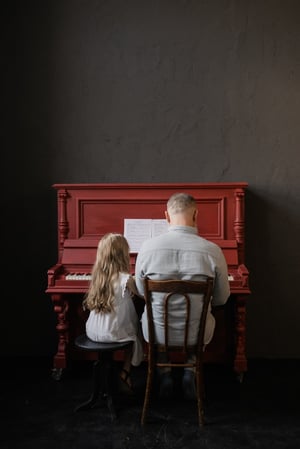As we age, our bodies undergo a variety of changes that can make us feel less comfortable in our...
What Is Music Therapy? And What Are the Benefits?
As a musician and music lover, I've always been captivated by its powerful potential to influence my emotions and even impact my brain activity. When I was younger, I listened to music while studying (a practice I maintain to this day). To this day, certain songs or melodies transport me to that place and connect me to whatever I was doing at the time. While science has determined that scent is the strongest sense tied to memory, sound—in this case, music—has a strong correlation to memory as well.
Music does something special to people. Different frequencies are known to produce very specific effects on people of all ages. Over years of study on the effects of sound and music, a therapeutic method called Music Therapy was developed. As a result, many people suffering from various mental disorders and disabilities have engaged in music therapy to great effect.
What is Music Therapy?
Music Therapy is defined as a clinical & evidence-based application of music interventions to achieve individualized goals within a therapeutic relationship under the direction of a credentialed professional who has completed an approved music therapy program. Most notably, this therapeutic method is used to address a variety of healthcare & educational goals:
 Promote Wellness
Promote Wellness- Manage Stress
- Alleviate Pain
- Express Feelings
- Enhance Memory
- Improve Communication
- Promote Physical Rehabilitation
Music therapy comes in two primary varieties: active and receptive. Musicianship and specific ear-training are unnecessary for participation. Anyone can benefit.
- Active Music Therapy: As the name suggests, participants must be actively involved in this type of therapy. It typically involves playing simple instruments, dancing, or singing, which encourages physical stimulation that is beneficial for physical health. And, it's a fun, communal activity.
- Receptive Music Therapy: Again, as the name implies, this therapy involves mindfully listening to specially curated recordings or live music. Song choices are made in consideration of the person's culture, generation, and personal experiences.
Physical Benefits of Music Therapy
Music promotes physical activity in many ways, depending on an individual's mobility level. The right beat can get a person's head bobbing, foot-tapping, or even inspire them to get up and dance. Especially in aging adults, it is crucial to find ways to promote increased movement, whether it be walking, dancing, or stretching along with the music, can improve the following:
- Heart and cardiovascular health
- Muscle strength
- Bone density
- Balance and coordination
- Flexibility
It is well-documented that music can be used as a powerful tool for pain management and stress relief. As previously stated, music has a temporal effect on listeners, often transporting them to a more joyful time in their youth. In addition, playing or listening to music helps stabilize the breath by promoting rhythmic breathing and improving respiratory health. The power of focused breathing has been noted by yoga and meditation experts to help release tension in the body, improve circulation, and lift your mood. The potential physical benefits of music therapy are:
- Lower blood pressure
- Reduced/stabilized heart rate
- Improved breathing
- Muscle relaxation
Mental and Emotional Benefits of Music Therapy
 At the same time, machine-like effects that promote physical health through music therapy also produce similar mental health effects by reducing symptoms of stress, anxiety, and depression. The primary goal of music therapy is to allow people to address issues and express themselves in ways that words alone cannot achieve.
At the same time, machine-like effects that promote physical health through music therapy also produce similar mental health effects by reducing symptoms of stress, anxiety, and depression. The primary goal of music therapy is to allow people to address issues and express themselves in ways that words alone cannot achieve.
Common ailments among older adults are depression and dementia. In addition, many older adults also suffer from PTSD. Therefore, music as therapy is a viable means of improving the quality of life for older adults suffering from these conditions.
Many older adults find themselves growing increasingly isolated as time passes, which significantly impacts mental health. To combat this growing feeling of isolation, group music therapy can offer a means of socialization and even provide a means of communication beyond reach for those with dementia. In addition, listening to or playing music regularly can improve communication abilities for older adults.
As previously stated, music therapy can help treat people experiencing trauma such as PTSD by helping them reduce stress and ground them in memories of a better time. Like teenagers belting out angst-filled tunes to alleviate the pain of a breakup, music is an effective tool for dealing with trauma in the elderly. Music therapy provides individuals living with trauma the ability to safely express their feelings of anxiety.
Music Therapy for Dementia and Alzheimer's Disease
 Music is linked to memory. Specific songs that we encounter through life become entangled with special memories. These memories may be joyful or painful. Either way, they can become tethers to significant moments in our lives. It's been well-documented that the music one falls in love with when they're entering their adolescent years becomes some of the most important music of their lives. For older adults with dementia and Alzheimer's disease, music can offer a means of accessing their past experiences and memories.
Music is linked to memory. Specific songs that we encounter through life become entangled with special memories. These memories may be joyful or painful. Either way, they can become tethers to significant moments in our lives. It's been well-documented that the music one falls in love with when they're entering their adolescent years becomes some of the most important music of their lives. For older adults with dementia and Alzheimer's disease, music can offer a means of accessing their past experiences and memories.
Musical memories are often unaffected by Alzheimer's disease. While Alzheimer's patients may not remember the names of loved ones, they maintain the ability to play musical instruments or are noticeably affected by songs from their past. While listening to music activates many areas of the brain, studies have shown that playing music activates a much greater portion of the brain, including centers related to memory and those related to imagination and creativity. Many people suffering from dementia and Alzheimer's disease spend large amounts of time in a sedentary state. Because of this, playing music helps to engage the body and alleviate physical stress and mental agitation.
People with dementia or Alzheimer's have great difficulty with communication. These difficulties often deepen feelings of isolation and depression, which can, in turn, have a more significant impact on their disease. Music provides a means of self-expression and helps them to communicate with their caregivers and visitors.
Familiar music can help ground those with Alzheimer's in their experiences and strengthen their sense of identity. While music therapy is by no means a cure, it can at least improve the quality of life of those battling this horrible disease.
Let us know in the comments below - Have you tried music therapy?
Subscribe to our blog to receive more posts like this - straight to your inbox!
Related Content:
- 6 Music Streaming Services to Listen to Your (New) Favorite Songs
- 10 Benefits of Listening to Music for the Aging Brain
- What Is Pet Therapy? Is It Right for You?
- Top Musical Instruments for Beginners to Learn in Retirement
- 10 Reasons You Should Learn an Instrument in Your Retirement
- The Top Resources to Learn to Play an Instrument from Home






